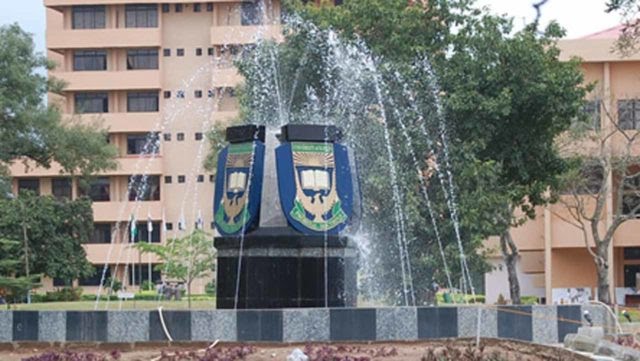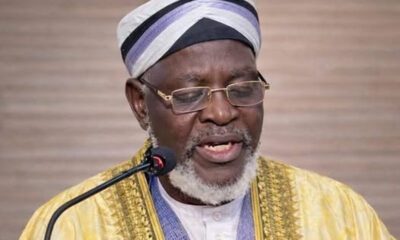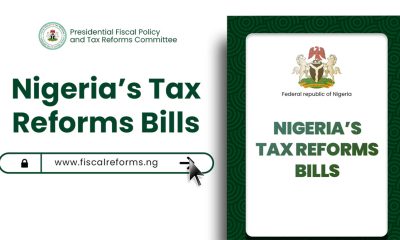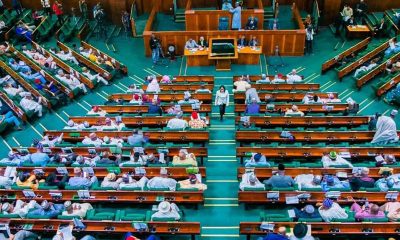Education
BREAKING: Reps’ bill finally ends disparity between BSc/HND

…as NABTEB Act amendment bill passes second reading
A bill seeking a perpetual end to the dichotomy between the university degrees of Bachelor’s of Arts/Science, BA/BSc and the Higher National Diplomas, HNDs awarded by polytechnics have been passed into law in the House of Representatives.
Titled “A Bill for an Act to Abolish and Prohibit Dichotomy and Discrimination between First Degree and Higher National Diploma in the Same Profession/Field for the Purpose of Employment; and for Related Matters”, the bill was read for the third time which was the final stage of the law-making process at Tuesday plenary.
The next stage would be concurrence with the Senate before it will be transmitted to the Presidency for the presidential assent.
The bill stipulates some punitive measures against any form of discrimination against holders of HND.
The Implication of the piece of legislation is that the two certificates are now at par with each other.
The deputy majority leader, Hon. Peter Akpatason moved for the third reading of the Bill and it was seconded by Rep. Aishatu Dukku.
The Bill was later voted on and approved for the third reading.
READ ALSO:
- FG launches Nigeria’s e-passport in UK to ease application process
- First Bank too big for one person to own, says Emefiele
- TUC kicks as NNPC says petrol subsidy ends in Feb, petrol to sell @ N340/l
Detailing the equality of Degrees and HNDs, the bill stipulates that “Notwithstanding any provision in any legislation, circular, regulation or policy guideline, First Degree and Higher National Diploma shall be deemed construed and treated as equivalent qualification for the purpose of employment and career progression at workplace in the public and private sectors of the Nigerian economy.
“Any provision in-laws, enactments, instruments, circulars, scheme of service, directives, or policies by whatever name called, which is inconsistent with the provisions of this bill, shall to the extent of the inconsistency be null and void, and of no effect.
“Holders of the First Degree and the Higher National Diploma (HND) shall be given equal treatment and opportunity in career placements, career progression, admission to further studies and privileges whatsoever in consideration of status as graduates of Nigeria tertiary institutions of higher learning.”
The bill also prohibited discrimination between the Degree and HND.
“All forms of discriminations and or dichotomy between First Degree and Higher National Diplomas for the purpose of employment, transfer of service, conversion of cadre, career progression, promotion, and other related issues in the public and private sectors of the Nigerian economy is hereby abolished.
“No person, authority, entity (body or corporate) in whatsoever name call shall discriminate and or undertake any action in any form whatsoever which is misconstrued as and or intended to give any preferential treatment in favour of and/or against holders of the First Degree or the Higher National Diploma.
READ ALSO:
- R/Madrid’s Karim Benzema gets one-year sentence, €75,000 fine over sex tape case
- My father never recovered from NDLEA ordeal – Baba Suwe’s son
- Saraki announces plans to contest 2023 presidential election
“Any person or entity in the public or private sectors of the Nigerian economy who contravenes the provisions of this bill commits an offence under this bill and shall be liable upon conviction to a term of two years’ imprisonment or a fine of N1,000,000 or both.
“Any person or entity in the public or private sectors of the Nigerian economy who design, prescribe and or specify any guidelines, terms or conditions of employment, career progression, and or any other instrument by whatever name called in violation of the provisions of this bill shall be guilty of an offence under this bill and liable upon conviction to a term of 1-year imprisonment or a fine of N500,000 (five hundred thousand naira) or both”, it states.
Prescribing appropriate sanctions, the bill states that any person who induces or encourages any other person for the violation of any of the provisions of this bill shall be liable upon conviction to a fine of N500,000, imprisonment for a term not exceeding one year or to both.
It further states that where an officer of any entity in the public or private sector fails to comply with the provisions of its provisions, the person shall be guilty of an offence and liable upon conviction to an imprisonment term of six months or a fine of N500,000 or both.
“Where in any proceedings against any person for an offence under this bill, it is established that any action constituting an offence under this bill has been committed by an officer, it shall be presumed that the action was done with the motive or intent of committing an offence under this bill as the case may be until the contrary is proved,” it added.
In a related development, the House also passed for second reading, a bill seeking the amendment of the National Business and Technical Examinations Board Act.
Titled “A Bill for an Act to Amend the National Business and Technical Examinations Board Act, Cap. N12, Laws of the Federation of Nigeria, 2004 to Improve the Scope of the Board, to Undertake Contemporary Business and Technical Examinations in Line with the National Policy on Education, Provide the General Purpose of the Results, Certificate and Awards Issued by the Board; and for Related Matters”, the bill is sponsored by Professor Julius Ihonvbere from Edo State.
READ ALSO:
- Police rescue kidnapped Zamfara secondary school students, others
- EFCC arrests Fani-Kayode for ‘forgery’
At the plenary, Hon. Julius Ihonvbere moved for the second reading of the Bill and it was seconded by Rep. Aishatu Dukku.
Leading the debate on the general principle of the bill, Hon. Ihonvbere stated that the Bill seeks to amend the Act establishing the board to end the rejection of qualified students by employers.
He added that the Bill also seeks to ensure the development of technical and vocational education schemes in Nigeria.
Contributing to the debate, Hon. Abubakar Yunusa lauded the spirit of the Bill as it seeks to correct the victimization of vocational students.
He urged the House to speedily pass the bill to make their certificates duly recognized, adding that it will cease the burden of unemployment, as well as enhance entrepreneurship.
Similarly, Hon. Abdulrazak Namdas also hailed the bill, calling for the more national will to apply the skills of technical and vocational training in society.
The lawmaker also urged the expedient passage of the Bill to save the future of teeming Nigerian youth.
The Bill was eventually voted on, approved for second reading and referred to the House Committee on Basic Education and Services for further legislative action.
Vanguard
Education
Check Your Name: UNILORIN Releases Updated NELFUND Refund List for 2024/2025 Students

Check Your Name: UNILORIN Releases Updated NELFUND Refund List for 2024/2025 Students
The University of Ilorin (UNILORIN) has released a new list of students eligible to apply for the 2024/2025 NELFUND refund, according to the UNILORIN Students’ Union (SU). Students who paid school fees before NELFUND disbursed funds directly to the university are now required to check their names and submit refund requests through the proper channels.
The official refund eligibility list has been shared in an Excel spreadsheet format and contains verified student details, including full name, matriculation number, department, and eligibility status. Students can search the file using their name or matric number to confirm their eligibility.
Those whose names appear on the list are instructed to fill the official refund form and submit supporting documents, including fee receipts and bank account details, to the Student Affairs Unit (SAU) or their respective Dean’s Office. The refund disbursement is gradual and ongoing, depending on NELFUND fund release schedules.
READ ALSO:
- Argungu Festival 2026 Highlights Peace, Stability, Economic Growth — Tinubu
- US Military Boosts Support for Nigeria’s Fight Against Insurgency With Ammunition, Troop
- Afenifere Calls for Immediate Take-Off of State Police as Terror Threats Rise in Yorubaland
For students whose names are not on the current list, they are advised to check their NELFUND portal status at portal.nelf.gov.ng and ensure all records are correctly verified. UNILORIN and the Students’ Union have also clarified that this is not the final list, as additional batches of eligible students may be added as verification continues.
Students are urged to act promptly, as following the prescribed procedures will ensure timely refund of fees paid in advance.
How to Check Your Eligibility
Students can confirm their eligibility by viewing the official list published by the university. To streamline verification, a table of students in the Department of Accounting and select departments is presented below.
| S/N | Matric Number | Student Name | Programme | Level | Department |
|---|---|---|---|---|---|
| 1 | 20/66MA093 | Johnson Babatunde Ogunwunmiju | B.Sc. Accounting | 400 | Accounting |
| 2 | 21/66MA002 | Zainab Oreoluwa Abdulrahmon | B.Sc. Accounting | 400 | Accounting |
| 3 | 21/66MA021 | Shukurat Oluwapelumi Adetunji | B.Sc. Accounting | 400 | Accounting |
| 4 | 21/66MA038 | Josephine Oluwateniola Akoki | B.Sc. Accounting | 400 | Accounting |
| 5 | 21/66MA049 | Vivian Member Aun | B.Sc. Accounting | 400 | Accounting |
| 6 | 21/66MA054 | Yusuf Olamilekan Babatunde | B.Sc. Accounting | 400 | Accounting |
| 7 | 21/66MA065 | Precious John Elijah | B.Sc. Accounting | 400 | Accounting |
| 8 | 21/66MA083 | Mariam Omowunmi Issa | B.Sc. Accounting | 400 | Accounting |
| 9 | 21/66MA088 | Toyosi Kolade | B.Sc. Accounting | 400 | Accounting |
| 10 | 21/66MA091 | Ayanfe Olaoluwa Makanjuola | B.Sc. Accounting | 400 | Accounting |
Note: The above table shows a partial list for illustration. The full list includes hundreds of students across various faculties and levels.
UNILORIN NELFUND Refund List 2025/2026
Check Your Name: UNILORIN Releases Updated NELFUND Refund List for 2024/2025 Students
Education
NELFUND Refutes UniAbuja Loan Diversion Claims

NELFUND Refutes UniAbuja Loan Diversion Claims
The Nigerian Education Loan Fund (NELFUND) has strongly refuted recent claims that officials of the University of Abuja (UniAbuja), including the vice‑chancellor and senior administrators, diverted or misappropriated student loan funds intended for indigent students.
In a detailed statement, NELFUND clarified that no verified evidence exists to support allegations that UniAbuja unlawfully withheld or diverted loan disbursements. The Fund said the speculation circulating in some media reports — which implicated the university’s vice‑chancellor, the Dean of Students’ Affairs, and other officials in the alleged diversion of multibillion‑naira funds — is unfounded and misleading.
The reports also suggested that UniAbuja failed to reimburse residual balances to students whose actual tuition fees were lower than the amounts disbursed by NELFUND on their behalf. In response, NELFUND maintained that its structured disbursement and reconciliation framework ensures that funds released for student loans are properly applied in line with its statutory mandate.
READ ALSO:
- NRC, Entertainers Finalise Plans for 2026 Valentine Train Ride
- 2027 General Elections: INEC Announces February 20 for Presidential Poll
- EFCC Nabs Three in Borno Over Viral ₦500 Naira Mutilation Video
Mrs. Oseyemi Oluwatuyi, NELFUND’s Director of Strategic Communications, emphasised that the Fund’s operations are governed by formal verification, compliance, and reconciliation protocols. According to her, loan funds are released through established institutional channels, and strict accountability mechanisms are in place to safeguard both student and institutional interests.
The Fund acknowledged that discrepancies or timing issues sometimes arise in the process of crediting student or institutional accounts, but said these are typically resolved through direct engagement with the relevant institutions, in accordance with due administrative processes.
“Where concerns arise regarding timelines of crediting student accounts or institutional reconciliation processes, NELFUND engages directly with the relevant institution to clarify and resolve such matters administratively and in accordance with due process,” the statement read.
NELFUND reiterated its commitment to transparency, accountability, and rigorous audit procedures, which include reliance on verified documentation and formal reconciliation mechanisms when addressing any issue related to its student loan disbursements.
The Fund also reaffirmed its dedication to protecting the interests of eligible Nigerian students and ensuring that all disbursements are applied lawfully and effectively to support access to tertiary education.
NELFUND Refutes UniAbuja Loan Diversion Claims
Education
Supreme Court Affirms Muslim Students’ Right to Worship at Rivers State University

Supreme Court Affirms Muslim Students’ Right to Worship at Rivers State University
The Supreme Court of Nigeria has ruled in favor of Muslim students at Rivers State University (RSU), affirming their constitutional right to practice Islam and perform religious activities on campus. The landmark judgment, delivered on February 10, 2026, closes a legal battle that has lasted for over a decade.
The ruling reinforces Section 38 of the 1999 Constitution (as amended), which guarantees freedom of thought, conscience, and religion for all Nigerians.
The Muslim Students’ Society of Nigeria (MSSN), Rivers State Area Unit, hailed the judgment as a historic affirmation of constitutional rights and the rule of law.
READ ALSO:
- Malami’s EFCC Trials Face Procedural Delay as Judge Steps Aside
- Umahi Vows to Quit if Road Project Fails Independent Quality Test
- NUFBTE Workers Occupy NAFDAC Lagos Office Over Sachet Alcohol Ban
The case traces back to 2012, when a mosque on the university campus was demolished, leaving Muslim students without a dedicated place of worship. The matter passed through the Federal High Court in 2013 and the Court of Appeal in 2017, before finally reaching the Supreme Court.
In a statement, the MSSN emphasized that the ruling is not a victory for one religion over another but a triumph for constitutionalism, equity, and justice. The society commended Muslim students for their discipline, resilience, and peaceful conduct throughout the legal process and acknowledged the efforts of its legal team and community leaders.
The MSSN called on Rivers State University management and relevant authorities to implement the ruling promptly by providing a dedicated and befitting place of worship for Muslim students on campus. The organization also urged students to respond with gratitude and maturity, emphasizing peaceful coexistence and mutual respect within the university community.
Experts believe this decision will have far-reaching implications for religious accommodation and inclusivity in public tertiary institutions across Nigeria.
Supreme Court Affirms Muslim Students’ Right to Worship at Rivers State University
-

 Education1 day ago
Education1 day agoCheck Your Name: UNILORIN Releases Updated NELFUND Refund List for 2024/2025 Students
-

 News19 hours ago
News19 hours agoOsogbo Sons and Daughters Mark 5th Anniversary with Awards, Political Undertones
-

 metro2 days ago
metro2 days agoWoman Arrested Over Murder of Nigerian E-Hailing Driver in South Africa
-

 metro2 days ago
metro2 days agoBoko Haram Terrorists Release Video of 176 Abducted Kwara Residents
-

 News1 day ago
News1 day agoAfenifere Calls for Immediate Take-Off of State Police as Terror Threats Rise in Yorubaland
-

 metro1 day ago
metro1 day agoUS Military Boosts Support for Nigeria’s Fight Against Insurgency With Ammunition, Troop
-

 metro3 days ago
metro3 days agoCourt Orders DIA to Produce Cleric Accused of Coup Plot by February 18
-

 metro1 day ago
metro1 day agoArgungu Festival 2026 Highlights Peace, Stability, Economic Growth — Tinubu













